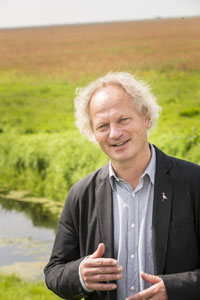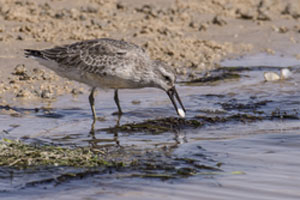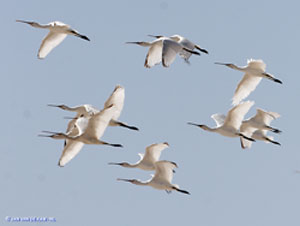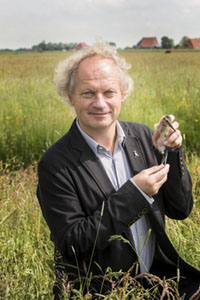Spinozawinnaar: 'Ik omarm de groezeligheid van de ecologie’
Aan Theunis Piersma, hoogleraar Trekvogelecologie aan de Rijksuniversiteit Groningen, is de Spinozapremie toegekend. Dat maakte de Nederlandse Organisatie voor Wetenschappelijk Onderzoek (NWO) vandaag bekend.

Piersma mag de NWO-premie van 2,5 miljoen euro vrij besteden aan zijn onderzoek: ‘Trekvogels zijn véél meer dan hun genoom alleen. Ze hebben een ongelooflijk aanpassingsvermogen aan hun veeleisende levenswijze en veranderingen in hun omgeving. Wij willen de wisselwerking begrijpen tussen die flexibiliteit en de omgevingen waarin ze opgroeien.’
Theunis Piersma is behalve hoogleraar aan de RUG ook aan het NIOZ Koninklijk Nederlands Instituut voor Onderzoek der Zee verbonden, als senior waddenonderzoeker.
Keuzes
Trekvogels doen hele ingewikkelde dingen. Ze bereizen de wereld op fascinerende manieren. En ze maken keuzes. In de loop van de seizoenen kiezen ze niet slechts hun plekken, maar ook de momenten waarop ze van de ene naar de andere plek trekken, vaak vele duizenden kilometers verderop. Als ze fouten maken, dan zijn ze er geweest.
Flexibiliteitsprobleem
De verscheidenheid aan soorten in de natuur, de biodiversiteit, staat onder grote druk. In een door mensen gedomineerde wereld hebben vooral de soorten nog kansen die zich kunnen aanpassen aan de snelle veranderingen. Wat bepaalt het vermogen tot aanpassing? Trekvogels belichamen dát deel van de biodiversiteit dat ons land verbindt met een groot deel van de rest van de wereld. Zij zijn een goed model om het flexibiliteitsprobleem te onderzoeken.
Groezelig
In een filmpje op de RUG-website vertelt Theunis Piersma dat de laatste 50 jaar de nadruk van biologisch onderzoek te veel lag op de genen en dat de rol van de omgeving – zelfs in de ecologie – werd onderschat. Deze overwegend exact-wetenschappelijke benadering is beperkend, omdat het een groot deel van het verklaringskader niet omarmt. Op zich is dat wel te begrijpen, want: ‘De ecologie heeft veel meer groezeligheid, dan de exact-ogende DNA-kunde. Maar ik vind het fantastisch om die groezeligheid juist te omarmen en daar dan toch de grote lijn in te vinden,’ aldus Piersma.
Levenslang volgen
‘We weten nog niet veel over de manier waarop de levensloop van (trek-)vogels vorm krijgt. Er zitten vast en zeker erfelijke aspecten aan vogeltrek, maar vogels leren in de loop van hun leven ook heel veel van elkaar, en ze doen eigen waarnemingen. Zo reageren ze op de omstandigheden die ze onderweg tegenkomen. Technologische ontwikkelingen, zoals steeds kleinere zenders, en nieuwe satelliet- en internettechnologie maken het nu mogelijk om individuele (trek-)vogels hun leven lang te volgen.’
Jeugdervaringen
Doen jonge vogels die in gezelschap van oudere vogels voor het eerst naar het zuiden trekken het beter dan jonge vogels die te laat zijn om van de ervaringen van ervaren dieren te profiteren? Piersma heeft de ambitie om voor het eerst trekgedrag te interpreteren in termen van de interactie tussen erfelijke informatie en contextuele informatie (over voedselbeschikbaarheid, natuurlijke vijanden en de van ouders en soortgenoten geleerde routines). In hoeverre bepalen jeugdervaringen – en dus niet de erfelijke aanleg - de latere trekroutines? In hoeverre zullen trekvogels in staat zijn om het hoofd te bieden aan het grote verlies aan leefgebied en de snelle klimaatveranderingen die hen boven het hoofd hangen? Is hun evolutionaire flexibiliteit een gevolg van hun vermogen om te leren? En, uiteindelijk: Waarom past de ene soort of het ene individu zich gemakkelijker aan omgevingsveranderingen aan dan anderen?
Burgerlijke stand
‘We zullen ons concentreren op drie Nederlandse icoonsoorten –kanoeten, lepelaars en grutto’s– zodat we kunnen voortbouwen op veel noodzakelijke basiskennis. Van deze soorten houden we al jaren de burgerlijke stand bij en wordt de kwaliteit van hun leefomgevingen in Nederland en langs de trekroute nauwlettend in de gaten gehouden,’ zegt de winnaar van de Spinozapremie.
Curriculum vitae
Theunis Piersma (1958) is hoogleraar bij het Centre for Ecological and Evolutionary Studies (CEES) van de Rijksuniversiteit Groningen. Hij studeerde biologie aan de RUG, waar hij als student al in 1980 zijn eerste onderzoeksexpeditie, naar Mauritanië, leidde. In 1994 promoveerde hij aan de RUG. Sindsdien werkt hij als onderzoeker zowel aan de RUG als bij het Koninklijk Nederlands Instituut voor Onderzoek der Zee (NIOZ). In 2003 werd hij in Groningen benoemd tot hoogleraar Dierecologie. Deze leerstoel verruilde hij in 2012 voor de nieuwe leerstoel Trekvogelecologie, ingesteld door een samenwerkingsverband tussen de RUG, het Wereld Natuur Fonds en de Vogelbescherming. In 2009 werd Piersma lid van de Koninklijke Nederlandse Akademie van Wetenschappen (KNAW).Meer nieuws
-
03 februari 2026
‘Daar zit een goeie kop op’
-
29 januari 2026
Microplasticonderzoek - opgeblazen nieuws of een echt gevaar?
